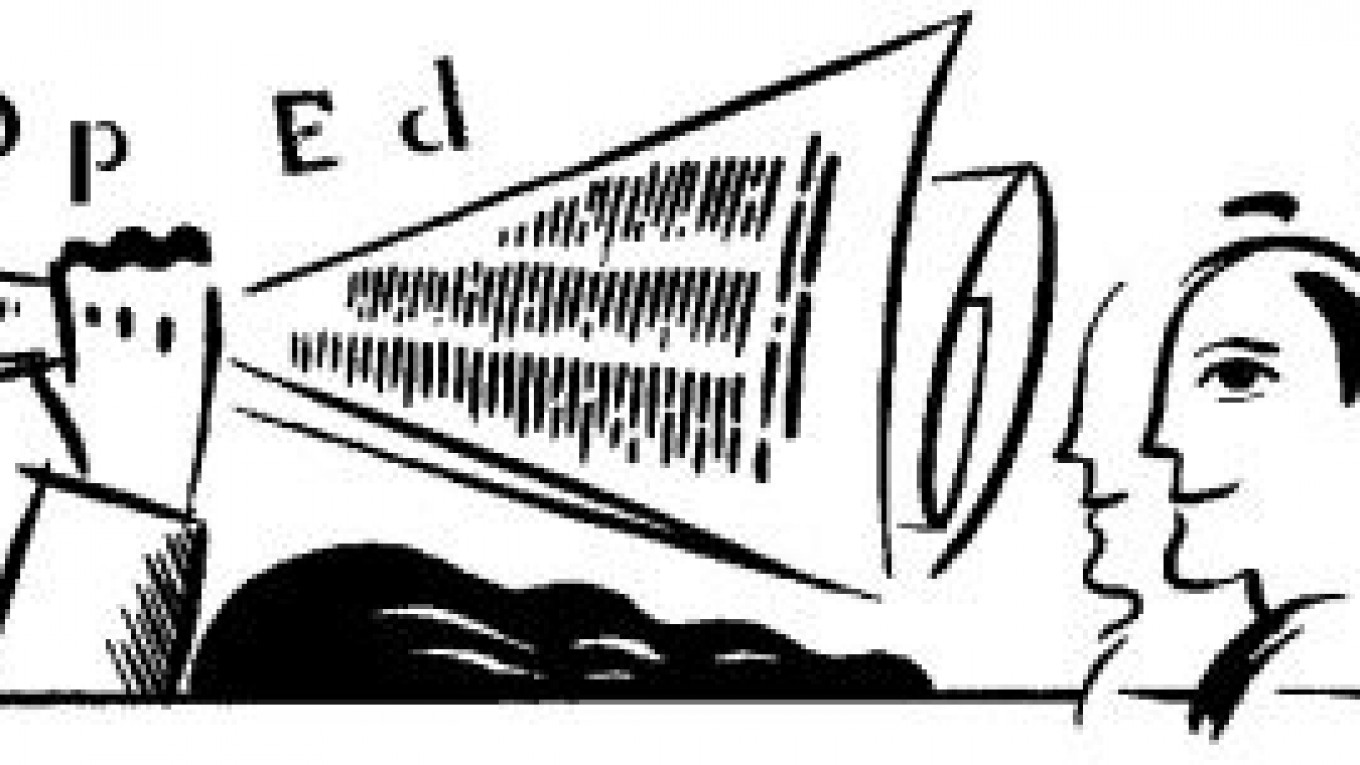In Moscow at a conference for young Russian journalists last week, I met Eduard Mochalov, who differed from most of the participants in having spent much of his working life as a farmer. He retains the ruddy countenance and the strong, chapped hands of the outdoor worker in a hard climate — in his case, that of the Chuvash Republic, about 700 kilometers east of Moscow.
Mochalov's story is that when thieves stole some of his cattle and pigs, he protested to the authorities, only to find himself in jail for eight months based on a wrongful accusation. Maddened by what he considered the result of corruption behind the scenes, he protested all the way up to President Vladimir Putin, going so far as to appear in Red Square with a placard telling his story. As he pursued justice, his farm went untended.
And so he turned to journalism. "I had no choice. The whole administration was corrupt, nothing to be done but fight them with words," he told me. Four years ago he founded a newspaper that he boldly named Vzyatka, which in Russian means bribe. It comes out nearly every month and is replete with investigations and denunciations of corruption in his locality. He prints some 20,000 copies and gives them away. Demand, he says, hugely outpaces supply.
The local administration and power brokers simply ignore him and carry on as before. That complaint was voiced by many of the young journalists at the conference, who see their revelations treated with the arrogant disdain of silence. They have no illusions about their situation. The majority work in the provinces and try to practice journalism in cities where the power structure, official and corporate, would often unite to squash or punish journalism that was out of line. When critical or revelatory pieces are published, they have found, as with Mochalov, that nothing changes.
As a result, corruption still reigns. This month's top scandal concerns Alexander Provotorov, head of the state-controlled Rostelecom, a leading telephone company. Provotorov is being investigated with others over his acts as a partner in Marshall Capital, a private equity firm, and the default of one of its subsidiaries on a $225 million loan. These matters are complex, long running and puzzling. Provotorov was an ally of President Vladimir Putin, who in the past year has launched an anti-corruption campaign.
Among citizens, corruption produces disgust, mirrored increasingly in popular newspapers like Moskovsky Komsomolets, as well as on numerous websites. It has become a settled conviction that the political and corporate classes have constructed an impregnable fortress of wealth and privilege with high walls to keep the rabble out. Boris Makarenko, a political analyst with the liberal Center for Political Technologies, says more and more Russians, especially those like the young journalists, no longer see themselves as subjects. They "want to make inputs."
There is much a citizen should input. The Indem think tank in Moscow, run by Georgy Satarov, a former aide to President Boris Yeltsin, estimates that corruption costs the country $300 billion to $500 billion a year. With a gross domestic product of some $1.5 trillion, that is up to one-third of the economy. Meanwhile, capital flight last year amounted to $84 billion, double that in 2010 and is still, it seems, increasing.
Russian corruption underlies the latest spat between Russia and the U.S. Last Friday, U.S. President Barack Obama signed the Magnitsky Act, which will deny visas to Russia officials thought to be connected with the violent death in jail of Sergei Magnitsky, a lawyer who pursued tax fraud within among officials in the Interior Ministry and the tax inspectorate. Investment banker Bill Browder — head of Hermitage Capital, which once had a large presence in the Russian financial market — hired Magnitsky as outside council. Browder had lobbied tirelessly for the Magnitsky bill both in the U.S. and Europe, something that seems to have infuriated the Kremlin. The State Duma is now trying to pass the "Dima Yakovlev bill," named after a Russian-born 2-year-old who died when his American adoptive father forgot that he had left him in a closed car in sweltering heat in 2008. The man was acquitted in the U.S. of involuntary manslaughter. As a result, the Russian adoption law was changed to allow more oversight by the authorities, but the case remains vivid enough in popular memory to act as a rallying call.
In his state-of-the-nation speech last week, Putin pledged to fight corruption and end the impression of the elite being "an isolated caste." He also lauded Russia's "civilization, unified by the Russian people, Russian language and Russian culture that unites us and does not allow us to dissolve." Yet the dissolving of Russia will not come from the imperialist designs of a hypocritical West, as Putin claims, but from the country's own challenges: a shrinking population, polluted cities, collapsing infrastructure, gross inequalities and ubiquitous corruption. To deal with these problems, Putin needs to be part of a global solution. For the moment, though, he isolates himself in the very problem he needs to fix.
John Lloyd co-founded the Reuters Institute for the Study of Journalism at the University of Oxford, where he is director of journalism. This comment was published by Reuters.
Related articles:
A Message from The Moscow Times:
Dear readers,
We are facing unprecedented challenges. Russia's Prosecutor General's Office has designated The Moscow Times as an "undesirable" organization, criminalizing our work and putting our staff at risk of prosecution. This follows our earlier unjust labeling as a "foreign agent."
These actions are direct attempts to silence independent journalism in Russia. The authorities claim our work "discredits the decisions of the Russian leadership." We see things differently: we strive to provide accurate, unbiased reporting on Russia.
We, the journalists of The Moscow Times, refuse to be silenced. But to continue our work, we need your help.
Your support, no matter how small, makes a world of difference. If you can, please support us monthly starting from just $2. It's quick to set up, and every contribution makes a significant impact.
By supporting The Moscow Times, you're defending open, independent journalism in the face of repression. Thank you for standing with us.
Remind me later.







